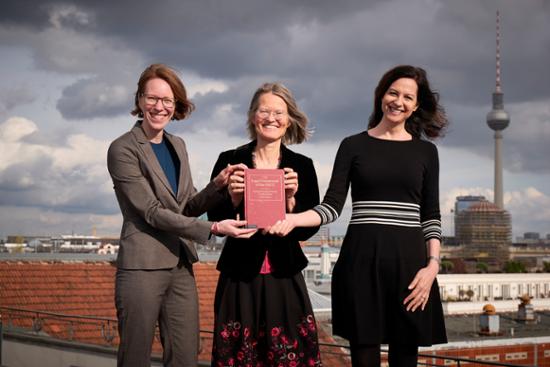Sie befinden sich hier: Institut Das Institut Büro Berlin Veranstaltungen Weitere Veranstaltungen Book Launch Legal Framework for the OSCE

On October 25th 2019, just short of the 30 year anniversary of the fall of the Berlin wall, 40 participants from administration, academia and politics gathered to discuss MPIL’s recent publication “The Legal Framework of the OSCE” at the Berlin-Brandenburg Academy of Sciences.
After a warm welcome by Alexandra Kemmerer, Mateja Steinbrück Platise, one of the three co-editors of the book, introduced the audience to the book’s key research questions, methods, arguments and results. The predecessor of the Organization for Security and Cooperation in Europe (OSCE), the world’s largest security organization, was founded in the midst of the Cold War in 1975 and currently suffers from a somewhat blurry organizational and legal structure. Therefore, the aim of this publication was threefold: firstly, substantiating and concretizing the problem of the OSCE’s legal status. Secondly, understanding the arguments and proposals for a solution currently tabled. And lastly, presenting novel reform proposals for a new legal framework for the OSCE. In the ensuing panel discussion, moderated by co-editor Carolyn Moser, several of the book’s results were taken into the debate and discussed constructively from different points of view. Niels Blokker (Leiden University) recalled the difficult context of a stalemate in the political debate about a potential reform when Germany took the chair of the OSCE in 2016. To overcome this deadlock, an additional academic perspective was desired – which ultimately led to the research project that resulted in the discussed book. Jan Klabbers (University of Helsinki) pointed out the consequences of the unclear legal status for practice. A closer look at the effects of the different forms of insecurity that result from this ambiguous status was taken by Cornelius Friesendorf (Institute for Peace Research and Security Policy, University of Hamburg ). He explained that the OSCE’s staff had to live with insecurity related to their employment conditions and their personal security. In consequence, he stressed, the organization as whole would lack effectiveness and efficiency.
Following the panel discussion, the debate was opened to the audience, and participants with high expertise from different backgrounds contributed to a rich exchange. The exchange was continued during a light lunch on the terrace of the Berlin-Brandenburg Academy of Sciences and Humanities. In her closing remarks co-editor Anne Peters expressed her gratitude to all those who contributed to the book and the event.
Report: Corbinian Ruckerbauer
Foto: Ostkreuz
At the Berlin-Brandenburg Academy of Sciences (BBAW).